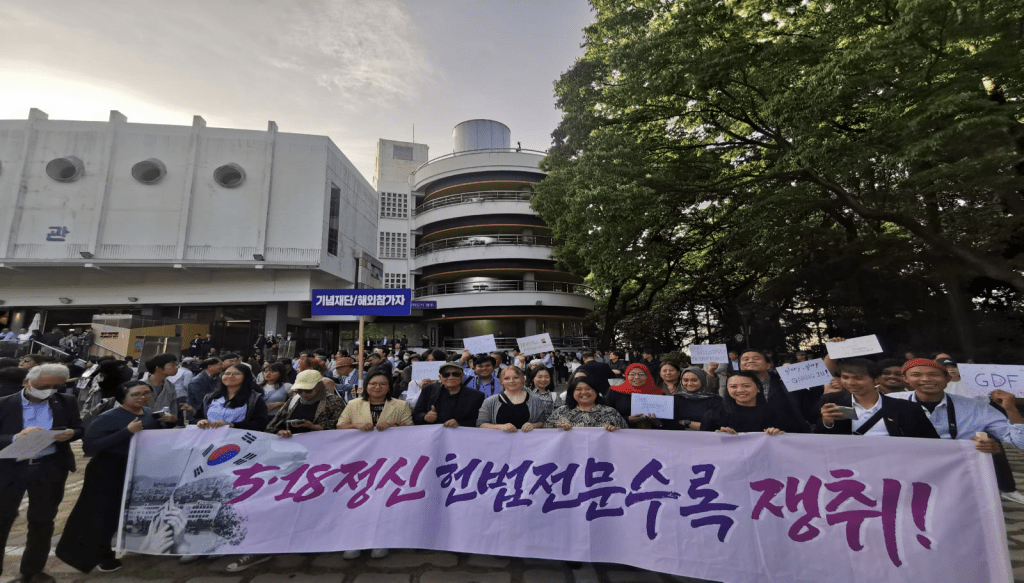AJAR’s Regional Advocacy Coordinator, Putri Kanesia, joined a panel of speakers at the Gwangju Democracy Forum (GDF) in South Korea from 14-18 May 2024. We proudly co-organised one session on Transitional Justice – International Norms and Trends which included Putri Kanesia alongside Oni Imelva (Aceh Truth and Reconciliation Commission Vice Chairperson, Indonesia), Moon Nay Li (Joint General Secretary of the Women’s League Burma, Myanmar) and Kyeongsup Park (May 18 International Research Institute, South Korea). The forum brought together experiences on transitional justice processes in the region, including recent developments with the Aceh TRC and an evaluation of the truth-seeking report released by the Truth and Reconciliation Commission of Korea. It also focused on the human rights situation in Myanmar.
Speakers reflected on the transitional justice progress that has been made in Southeast Asia, examining how it has been implemented across different contexts and whether judicial and non-judicial mechanisms have been fully implemented as expected. Putri Kanesia provided key examples of lessons learned from the Truth and Reconciliation Commission (CAVR) in Timor-Leste and the Aceh Truth and Reconciliation (KKR) in Indonesia. One key point was that although the TRCs have provided valuable recommendations, implementation continues to be challenge. For example, it took more than a decade in Timor-Leste for the national government to follow up on the findings and recommendations of the TRC. In Indonesia, while the Aceh TRC findings report is significant — as it is the only official report which recognises crimes against humanity – there remains the need to ensure the recommendations for strengthening peace, upholding justice and ensuring reparations are implemented. In the context of Myanmar, the current political situation continues to be a barrier to the implementation of any meaningful transitional justice processes. Despite this, work continues on documentation, and developing capacity including establishing transitional justice as a key priority with the National Unity Government (NUG) and promoting awareness on a regional and international level.
In addition to the TRCs, there are other initiatives that signal a step forward in acknowledging gross human rights violations. In Timor Leste, the Centro Nacional Chega! (CNC) was established as a public institution with a mandate for memorialisation, documentation, promoting education, disseminating the CAVR report and promoting survivor solidarity. The CNC has made progress in educating young people about past human rights violations and developing a manual for teaching human rights to the police and military. Recently, in Indonesia, President Joko Widodo acknowledged 12 incidents that occurred in the past which amount to gross human rights violations and launched the Nonjudicial Resolution of Past Serious Human Rights Violations (PPHAM) to take concrete actions to restore victims’ rights and prevent similar atrocities from occurring again. Despite this, the initiative has been highly criticised for lacking victims’ participation.
In light of the challenges faced in implementing transitional justice processes, Putri Kanesia drew attention to the importance of civil society-led initiatives in responding to victims’ needs. Examples include the Milk Tea Alliance movement which has connected activists across the region educating people on the human rights situation in Thailand, Hong Kong, Taiwan and Myanmar. There has been the #BikeforMyanmar campaign in response to the Myanmar military coup in 2021 to raise awareness and apply regional pressure at the ASEAN Leaders meeting in Jakarta. The civil disobedience movement (CDM) also continues to signify the people’s resistance to the military junta, with support from the National Unity Government (NUG) and the committee representing Pyidaungsu Hluttaw (CRPH), this movement has continued to grow.

Participants learned about the role of memorialisation in Gwangju. Pictured to the left are participants from GDF 2024 joining the May 18 Eve rally on 17 May 2024 in Geumnam-ro, Gwangju, South Korea.
May 18 Democratic Uprising in 1980. The forum brings together human rights activists, youth and academics, journalists, victims and family members of victims of human rights violations to discuss transitional justice within the current context of democratic regression, ongoing human rights violations, climate crisis, poverty and inequality. As well as sharing experiences from across the region, participants focused on the importance of civil society movements and strengthening solidarity.
You can find a complete copy of speakers’ scripts and all sessions at the Gwangju Democracy Forum 2024 here.